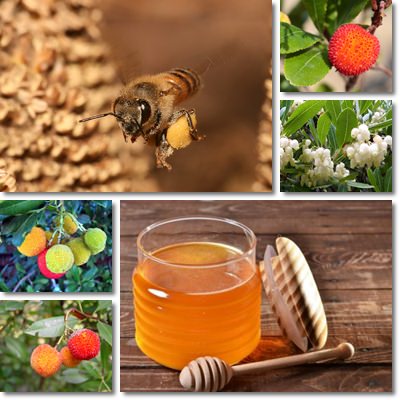The Strawberry Tree (Arbutus unedo), or cane apple, is a species of small tree that is the source of a particularly bitter honey known as strawberry tree honey, arbutus honey or miele di corbezzolo. What makes this variety of honey so popular is its unusual savor that combines sweetness and bitterness in a unique taste experience, but also its high antioxidant content. The variety owes its medicinal effects to its high antioxidant content, but also to its superior antibacterial and immunomodulating properties and good nutritional profile.
What is strawberry tree honey?
The variety is a monofloral honey, meaning it is made mostly from the nectar and, incidentally, pollen of the strawberry tree blossoms. There are only several regions in the world with a strawberry tree population large enough to support honey production: central and southern Italy, notably the island of Sardinia, but also Greece and Portugal and parts of the United Kingdom. However, if there happens to be other plants in bloom at the same time in the vicinity of arbutus trees, honey bees will most likely not discriminate between the flowers and collect their nectar too. Because not even monofloral honeys are 100% from a single source of nectar.

Can strawberry tree honey cause an allergic reaction?
Technically all honeys can trigger allergic reactions, some more severe, some less, depending on the person. If you are allergic to strawberry tree pollen, you are most likely allergic to strawberry tree honey as well. This is because the honey, while made from strawberry tree flower nectar, contains pollen as well, pollen being the allergen.
When honey bees gather nectar to make honey, pollen sticks to them which then ends up processed in the resulting honey and represents a potential source of allergic reactions. Sometimes honey bees collect pollen voluntarily, not just for honey-making.
Some people are allergic to honey not because they are allergic to the pollen in it, but because they are allergic to secretions honey bees leave in the honey when they process it. So if you have an allergy to honey in general, you will most likely have to avoid strawberry tree honey too. Because food allergies can be severe and even life-threatening, avoid those foods that you know or suspect will trigger an allergic reaction. Ideally, have a skin allergy test beforehand to make sure a certain honey or other food product is safe to eat for you.
What does strawberry tree honey look like?
Generally, this variety has a dark pigment and looks similar to forest honeys. It has a dark amber color, sometimes dark brown, sometimes with reddish reflexes. As it crystallizes, the color tones down and becomes mellower, a sort of paler, one or two shades lighter yellowish brown.
From my experience with the honey, based on products I’ve tried personally, I find strawberry tree honey comes in different shades of caramel and cocoa brown and you never really get the exact same honey color. However, various factors that directly impact the amount of strawberry tree nectar sourced by honey bees can lead to more or less noticeable differences in pigmentation.
What does strawberry tree honey taste and smell like?
Arbutus honey has a unique taste that you either love, or don’t. The honey has a strong, pungent aroma and a mildly sweet taste at first, followed by a stronger, more persistent and overpowering bitterness, but with an unusual fine quality to it. There is also a slight astringency to the honey towards the end of the taste process.
The flavor profile is rich and includes rather strong malty, coffee grounds or cocoa beans notes, but also a sort of burnt aroma or leathery notes. It’s not necessarily the most bitter honey, but its flavor profile is definitely strong, unexpected, different.
Strawberry tree honey also has a dense consistency that gives it a certain creamy texture. However, differences in taste may appear from one batch of honey to another. If the honey is sweeter, for example, it may be because of a higher content of nectar from other plants. Climate, weather conditions and other factors may influence its taste.

What is strawberry tree honey good for?
What are the health benefits of strawberry tree honey? There are good reasons why the honey is so popular and most of these reasons have nothing to do with taste. Discover below what are the 5 most amazing properties and benefits of strawberry tree honey.
1) High antioxidant value
The main reason why this particular variety is so healthy is its strong antioxidant effects. Actually, the variety has been said to exert a stronger antioxidant effect than acacia, chestnut and other varieties of honey.
The honey has been shown to be rich in polyphenolic compounds and other elements with outstanding antioxidant and free radical-scavenging effects.
Research shows that homogentisic acid is the primary antioxidant and free radical scavenger in the honey, followed by ascorbic acid or vitamin C, gallic acid and quercetin (Physicochemical Parameters and Bioactive Compounds of Strawberry Tree (Arbutus unedo L.) Honey). Antioxidants protect our cells from free radical damage and subsequent oxidative stress that can set off disease and premature aging.
2) Great natural antibacterial activity
Strawberry tree honey is one of the varieties of honey with the strongest natural antibacterial properties. In addition to hydrogen peroxide (a natural antibacterial), low moisture content and acidity, all of which inhibit bacteria growth and help reduce bacteria numbers, the honey owes part of its antimicrobial action to antioxidants as well. According to research, honey can help improve wound healing time by reducing bacterial load.
3) Strong immunomodulating effects
More plainly put, arbutus honey helps boost immunity. Research shows that healthy individuals eating approximately 70 g of strawberry tree honey a day, dissolved in water, showed a 5% increase in white blood cell count, meaning the honey helped increase the number of immune system cells available, which may contribute to a better immune system response in case of infection and disease (Beneficial Effects of Strawberry Tree (Arbutus unedo L.) Honey Supplementation in Men).
4) Varied vitamins and minerals profile
Strawberry tree honey has been shown to contain small amounts of vitamin C, but also iron and many other micronutrients, and macronutrients, including amino acids and simple sugars, all of which directly contribute to good health.
The high content of natural sugars in the honey provides quick energy for the body to use and accounts for benefits such as preventing and correcting hypoglycemia and the feelings of unwell associated with it, including muscle weakness and feeling faint.
5) Anti-inflammatory and soothing action
Because of its anti-inflammatory and soothing effects, raw strawberry tree honey is great for respiratory tract infections in particular, but also stomach conditions. It can be consumed daily as it is or in tea (remember to let it cool down before adding the honey) for sore throat, cough, tonsillitis etc. to reduce bacteria numbers and inflammation and help calm the irritated throat mucosa by forming a protective coating that allows the throat lining to heal.
It can help with stomach conditions as well. For example, eating the honey first thing in the morning on an empty stomach is said to help with stomach aches and discomfort, gastritis and even ulcers. Eating and drinking should be delayed for at least an hour after taking the honey. Applied on the skin as a face mask, strawberry tree honey can help improve skin appearance, restore brightness and smoothness and even prevent more severe acne breakouts.
Conclusion
Strawberry tree honey may not be to everyone’s liking, but its rather exquisite bitter flavor can grow on us. However, what wins many people over is its strong antibacterial and antioxidant activity, good nutritional value as well as the fact that it lacks contaminants. The honey helps with stomach aches, hypoglycemia, skin issues and respiratory infections and should be consumed in its natural state, unaltered by heat or refining processes if we want to enjoy all the wonderful health benefits it has to offer.
